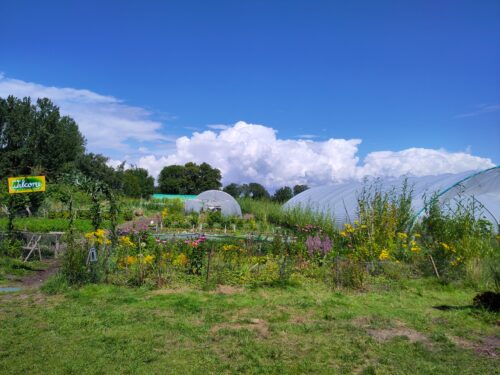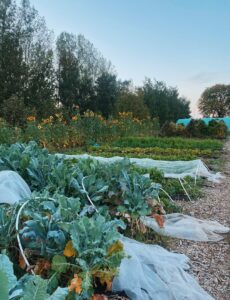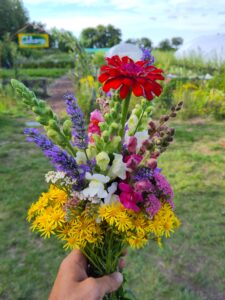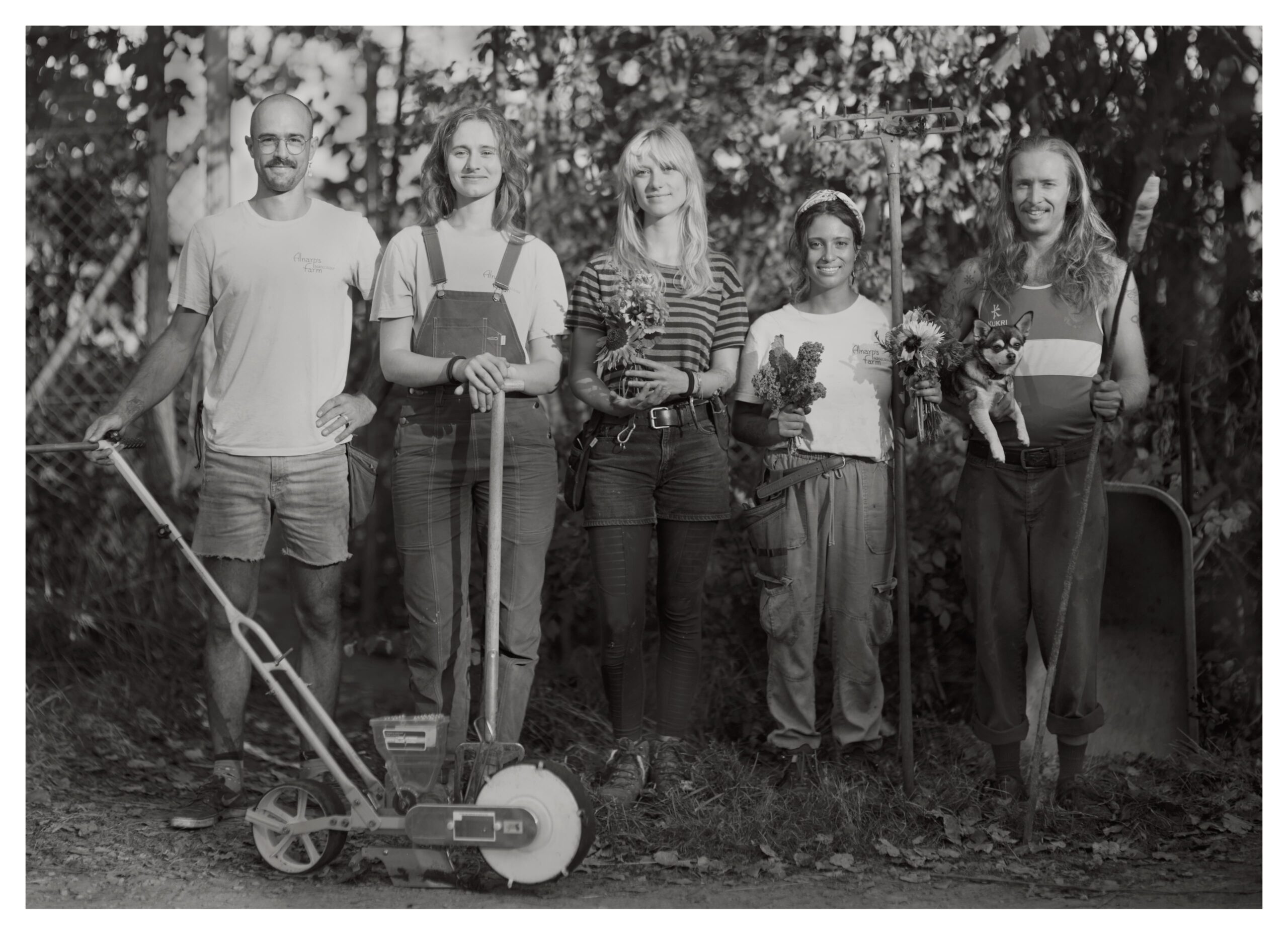The Story of Success highlights innovative regional companies in Plant and Food science which are bridging the gap between research and industry. In this interview, Leòn Pepe Biundo, the Production Manager of Alnarp’s Agroecology Farm, introduces this student initiative focused on sustainable, hands-on, agroecological farming. Combining ecological practices with community building, the farm contributes to the local food system while providing learning opportunities for students! Interested in learning more? Read the interview below!

Welcome to Alnarp’s Agroecology Farm!
Please briefly introduce your company.
The Alnarp´s Agroecology Farm, located on the campus of the Swedish University of Agricultural Sciences (SLU) in Southern Sweden, is a student initiative focused on sustainable, hands-on, agroecological farming. Established in 2021 by a group of passionate agroecology master students, the farm offers an environment where theoretical knowledge is transformed into real-world application. The farm operates on 2500 sqm, designed to experiment with and demonstrate agroecological practices that enhance biodiversity and soil health, promote sustainable food production and feed a local community. The farm serves not only as a cultivation area but also as a platform for knowledge exchange, where students, farmers, and researchers can come together to experiment, innovate, and learn together.
Following the agroecological lens, Alnarp´s Farm promotes vegetable production with a holistic vision of farming that considers environmental, social, and economic factors. Combining ecological practices with community building, the farm contributes to the local food system while providing learning opportunities for students and other stakeholders. The produce grown at the farm is distributed through a Community Supported Agriculture (CSA) model, sold at local farmers’ markets, REKO-ring and showcased during seasonal harvest festivals. This unique blend of education, sustainable farming, and community building makes Alnarp’s Agroecology Farm a model for future-focused small-scale agriculture
What was your motivation for starting the company?
The core motivation behind establishing Alnarp’s Agroecology Farm was to bridge a recognized gap between theory and practice in agricultural education at SLU. Agroecology Master students realized that while there was substantial emphasis on the academic aspect of agroecology within their coursework, there was a lack of practical, real-life applications of the concepts they were studying. Thus, a space was created where students could experiment with their knowledge, and implement ecological farming techniques while being in a safe space for trial and error.

Vegetable beds
The goal is to demonstrate the holistic nature of agroecology since it is a scientific discipline, a practical approach as well as a movement with the potential to transform local food systems into more sustainable and resilient entities. By focusing on principles such as biodiversity, soil regeneration, ecosystem services and community engagement, the farm provides students and visitors with a model approach to how to implement sustainable agricultural practices that benefit both the environment and local communities. Furthermore, the farm’s collaborative nature also facilitates conversations between different groups—farmers, students, educators, and local consumers work together to create an inclusive, sustainable food system.
Can you tell us more about the ingredients and technologies you use?
The farm combines traditional agroecological practices with modern market gardening strategies, always ensuring low-impact and environmental soundness. Key techniques include no-till soil management combined with compost mulching, crop successions, liquid fertilization, crop diversification through polycultures, crop rotations, organic pest control and agroforestry. Sustainable practices like brewing organic fertilizers from local resources and creating biodiversity patches, are of high relevance for the operations. These practices enhance the natural balance of the agroecosystem by encouraging biodiversity and microbial activity, reducing pests naturally, decreasing input dependencies, promoting carbon sequestration and improving the future health of the soil. Additionally, the CSA model integrates community members directly into the farm’s economic structure, fostering shared responsibility between producers and consumers.
Essentially, the combination of agroecology and market gardening management aims to integrate diversity into the production system, to make the farm more resilient in the face of global warming.
What makes you different from other companies in your sector? What novelty do you bring?

Fresh cut flowers
At Alnarp’s Agroecology Farm – agroecology is at the heart of the production rather than profitability and efficiency. Thus, Alnarp’s Agroecology Farm differentiates itself by using a participatory model for food production, embedding ecological and social stewardship into every aspect of its operations. As a not-for-profit educational venture, unlike other commercial farms, it bases the decision-making process on agroecological principles which combine environmental sustainability with production, research, community welfare and individual involvement. The farm´s main sales channel was chosen accordingly – the CSA model, which ensures a direct connection between the farm and local consumers. CSA members invest in the farm at the start of the growing season, supporting its operations and receiving a share of the harvest in return. This model emphasizes demand-based productions, emotional connection, transparency and mutual support, and it encourages consumers to take a more active role in their food systems. The farm’s work on social and economic sustainability models, including solidarity shares for lower-income individuals, adds a unique approach that extends beyond traditional organic farming methods.
What type of market do you target?
The primary market for Alnarp Agroecology Farm is local consumers who are invested in supporting sustainable, ecologically responsible agriculture. Through its CSA program, the farm directly engages with individuals and families who value fresh, organic produce and want to participate in community-supported farming. By building a direct relationship, the farm provides transparency around food pricing, and helps to cultivate a local food culture where consumers understand the seasonality of Scandinavian food production as well as environmental just production methods.
In addition to local consumers, the farm also serves as a resource for students, researchers, and agricultural professionals who are interested in sustainable farming methods. Through workshops, educational programs, and research initiatives, the farm reaches a broad audience both locally and internationally. Its focus on agroecology makes it a model for other institutions and farms interested in transitioning to more sustainable practices.
Where are you now, and where will your company be in 5 and 15 years?
Currently, Alnarp’s Agroecology Farm has been established as a centre for agroecological education and practice in Sweden. It has created a strong community around sustainable agriculture, with students, local consumers, and researchers participating through community events, workshops, and academic research. In the future, Alnarp’s Agroecology Farm aims to expand its role as a model for sustainable, low-tech, small-scale agroecological practices across Scandinavia. By focusing on replicable, low-budget systems, the farm intends to demonstrate viable pathways for environmentally sound and community-centred food production. A key component of this vision is to deepen connections with academia, transforming the farm into a holistic research hub for interdisciplinary studies. In this living laboratory, researchers could explore the interconnected multitude of impacts and benefits provided by local food systems on community well-being, environmental health, ecosystem services, and food security amongst others.
In the longer term, the vision includes influencing food policy, creating a greater impact on sustainable food systems, and supporting a wider network of like-minded agroecology initiatives across Europe. The farm intends to serve as a dedicated educational space, welcoming international students for internships and providing postgraduate students with advanced practical skills necessary for careers in sustainable agriculture. By becoming an apprenticeship centre for small-scale farmers, Alnarp’s Farm aims to cultivate the next generation of eco-conscious, community-oriented food producers.
As part of the physical long-term plans, the farm envisions expanding to a size of four hectares to incorporate an even greater diversity of farming systems, including market gardening, agroforestry alley cropping, holistic livestock grazing, wetland conservation, and cut flower production. Basically, a modern model of multifaced agricultural practices managed by a community of farmers to maximise the synergies between the cropping systems and increase biodiversity while strengthening the resilience of the agroecosystem as well as the local food security. The aim is to continue pushing the boundaries of what agroecology can achieve, particularly in terms of climate resilience and social sustainability on a range of different production scales. Diversity brings resilience – growing together at the Alnarp´s Farm for a better future!

Leòn Biundo (Production Manager), Ingrid Svedhem (Sales & Market Manager), Claire Feller (Community Manager), Mariana Forero (Secretary & Project Manager) and NiallO´Brien-Gregg (Culinary Coordinator)
Thank you for a very interesting interview, Leòn! We wish you and Alnarp’s Agroecology Farm all the best in future endeavours!
(Photo: Vegar Moen and Alnarp’s Agroecology Farm archive)

